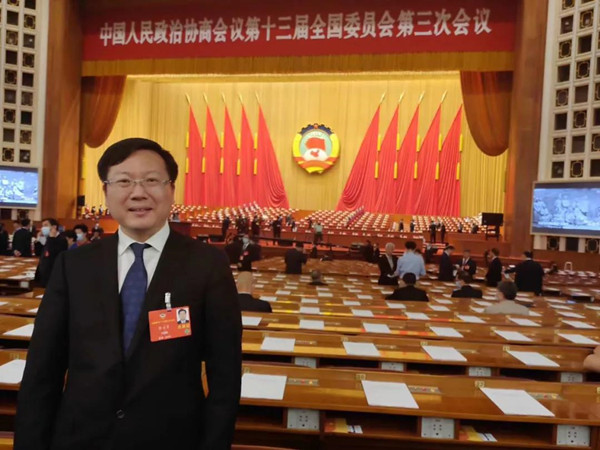Zhang Yunyong: Promoting 5G Technology Application
As a new generation of information and communication technology, 5G will be a basic carrier to connect various industrial fields. Promoting its application has been written into this year's government report.
In the view of Zhang Yunyong, CPPCC member and general-manager of the product center of China United Network Communications Group Co., Ltd. (China Unicom), 5G will affect the development of the country, society and economy. It will also play a role in industrial upgrading.
He said that 5G technology is a key part of the new infrastructure construction and has contributed greatly to prevention and control of the COVID-19 pandemic and resumption of work during this year's outbreak.
"It is a main digital infrastructure to support transformation of the economy and society to digitalization, networking and intelligentization as well as a crucial engine to drive development of the digital economy, industrial upgrading and science and technology," Zhang said.
A highland of a new round of science revolution, 5G will also contribute to creating more jobs, increasing investment, advancing consumption upgrading and promoting development of relevant industries.
According to a report on China's 5G economy jointly released by the China Center for International Economic Exchanges and the China Academy of Information and Communications Technology in 2019, the total investment in 5G will be about 900 billion yuan ($125.81 billion) in 2020 and in 2025 the amount will reach 1.5 trillion yuan.
In 2035, about 22.3 million jobs will be created in relation to 5G technology and relevant economic output will be about $13.2 trillion. 5G technology will then be used in all aspects of people's lives and will greatly improve production efficiency.
Generally speaking, 5G is a potential technology in the high-quality development of society and the economy.
However, Zhang pointed out that new infrastructure construction of 5G technology also faces challenges such as huge investment and construction costs, high electricity costs caused by large power consumption, high enterprise value-added tax rates and incomplete industrial applications.
Zhang explained that a large number of 5G base stations will have to be built for about 2.3 trillion yuan including direct investment estimated at about 1.2 trillion yuan. Such financial input is 2 to 4 times that required for 4G infrastructure construction.
With the number of base stations twice as many as those needed for 4G, the 5G mobile internet is expected to require more than 9 times as much power as the 4G internet, which means that in 2025, the three operators — China Unicom, China Mobile Limited (China Mobile) and China Telecommunications Corporation (China Telecom) — will spend 250 billion yuan on electricity. The high power price may become a factor to restrict 5G development.
As wide coverage of 5G internet is a base to development of new infrastructure, negative factors that hinder its construction have to be overcome.
In terms of the high tax, Zhang said the government would develop favorable financial policies for enterprises, covering such matters as cheap financing, tied loans, multi-level capital markets, mergers and acquisitions, IPO and bonds.
He also suggested promoting the PPP mode in 5G infrastructure construction to build a community of shared interests instructed by the government and dominated by the market with multiple participants.
To lower the electricity price, Zhang suggested promoting the cascade utilization of energy. For example, giving greater discounts to the operators and including them in the power reform pilot industry, through which the power bills are expected to be lowered by 70 billion yuan annually.
Zhang stated that a deep integration between 5G and the real economy should be promoted which will advance digitalization of traditional industries and development of emerging ones.

Zhang Yunyong, CPPCC member and general-manager of the product center of China United Network Communications Group Co., Ltd. (China Unicom), shares his suggestions on developing 5G infrastructure at this year's two sessions. [Photo/sasac.gov.cn]
(Executive editor: Wang Ruoting)



